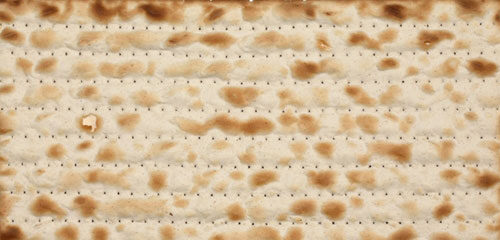There have been many times during the Days of Unleavened Bread when I told friends and relatives I eat nothing with leavening agents such as yeast, baking powder, baking soda. “What’s that?” is a familiar reply.
For me, there is an unexplainable feeling whenever I read about or call those five words “The Days of Unleavened Bread.” It’s a feeling bordering reverence because I know deep down in my thinking these days mean something to the Most High God who desires humanity to observe them. When I read in the book of Acts of several instances when the apostles kept God’s annual Sabbaths, including the Days of Unleavened Bread, I realise how important it was for them to celebrate these Holy Days or “appointed” times of God.
With that kind of disposition, I always find it an inspiring treat to be able to tell someone exactly what these days portray, especially when Christendom ignores them and embrace pagan holidays instead. The Days of Unleavened Bread are so meaningful and relevant to the life of the Christian today that it goes without asking once you come to the knowledge and understanding they are not Jewish days, rather they are the “feasts of the Lord,” or “my feasts,” as God states when He outlines them in Lev. 23.
So, what does an Old Testament festival has to do with Christians today? Wasn’t that festival for the Jews? It was only for the Jews in so much as they were the only people God was dealing with at that time. Psalm 147:19 “He sheweth his word unto Jacob, his statutes and his judgments unto Israel. He hath not dealt so with any nation: and as for his judgments, they have not known them. Praise ye the Lord.”
Leaven in the Bible pictures sin. Paul uses this analogy in 1 Cor. 5:7 to show how we should try to get sin (or leaven) out of our lives “Purge out therefore the old leaven, that ye may be a new lump, as ye are unleavened. For even Christ our Passover is sacrificed for us: Therefore let us keep the feast, not with old leaven, neither with the leaven of malice and wickedness; but with the unleavened bread of sincerity and truth.” He was urging Christians in the Corinthian church to keep the feast or Days of Unleavened Bread with sincerity and truth, but before they do that, they had to get rid or purge out the leaven (sin), so they may be a new lump, a new person who strives to be unleavened or stop habitually sinning.
The imagery of the festival goes back to the days when Egypt (picturing sin) held Israel captive. Egypt is often pictured as a type of sin. God’s festivals were all given after Israel left Egypt, so just like how the Days of Unleavened Bread pictured their coming out of sin (Egypt), the Christian today observe it to mark their efforts to “purge,” or put sin out of their lives.
In biblical history, there are some significant events that occurred and should not be overlooked and one of them involved our Saviour Jesus Christ. Let us go back to its genesis.
One of the greatest biblical events ever recorded was the exodus of the Israelites from Egypt. It occurred during the Days of Unleavened Bread (Numbers 33:3). It’s believed the crossing of the Red Sea might have occurred on the last Day of Unleavened Bread, and when Israel entered the Promised Land, the city of Jericho was taken during this festival.
In 2 Chronicles chapters 29 to 31, we see a religious reform led by King Hezekiah, and chapters 34 and 35 and another reform through King Josiah during the Days of Unleavened Bread to bring God’s people closer to him. The Word of God speaks of the excitement and joy Israel experienced when they re-dedicated their lives to the God of Abraham, Isaac and Jacob (2 Chronicles 30:21-23 and 2 Chronicles 35:17-18).
However, the most significant event to occur on Earth during Jesus’ presence here is His resurrection from the dead. Without the resurrection, there would be no Christianity. The Bible is clear the Christ was crucified before a Sabbath. Christendom believes this Sabbath was the regular Saturday Sabbath. John 19:31 clearly shows that Sabbath was “a high day” Sabbath, which means one of the two Sabbaths of the Days of Unleavened Bread. The first and last days of the seven-day festivals are Sabbaths (Lev. 23). The first day begins at evening following the Passover. Because Jesus was crucified on the Passover, the first Day of Unleavened Bread would have started later that evening, hence the haste not to allow Jesus body to remain on the cross as the (annual) Sabbath was about to begin.
Jesus Christ then was in the tomb during the Days of Unleavened Bread. Most importantly, he also rose from the dead during this seven-day festival. Isn’t it any wonder 1 Cor. 5:7 says “Christ our Passover is sacrificed for us… the unleavened bread of sincerity and truth.” Notice it did not say Christ our Easter, no Christ our Passover… the unleavened bread.”
As a Christian, I would consider this significant, especially at time when the scriptures forbid us to eat nothing with leavening agents, yet it’s the time many Christians eat their hot-cross buns and other baked products laced with leaven. How sad?
There’s much to learn about the significance and importance of the Days of Unleavened Bread on the Christian calendar. If we could only follow the Word of God rather than some ancient tradition that has nothing to do with the death, burial and resurrection of Jesus Christ. If there is ever a time when the Days of Unleavened Bread deserve your attention and study, the time is now! For more on this subject, download FREE our booklet, GOD’S SEASON PLAN







Share This Article
Choose Your Platform: Facebook Twitter Linkedin